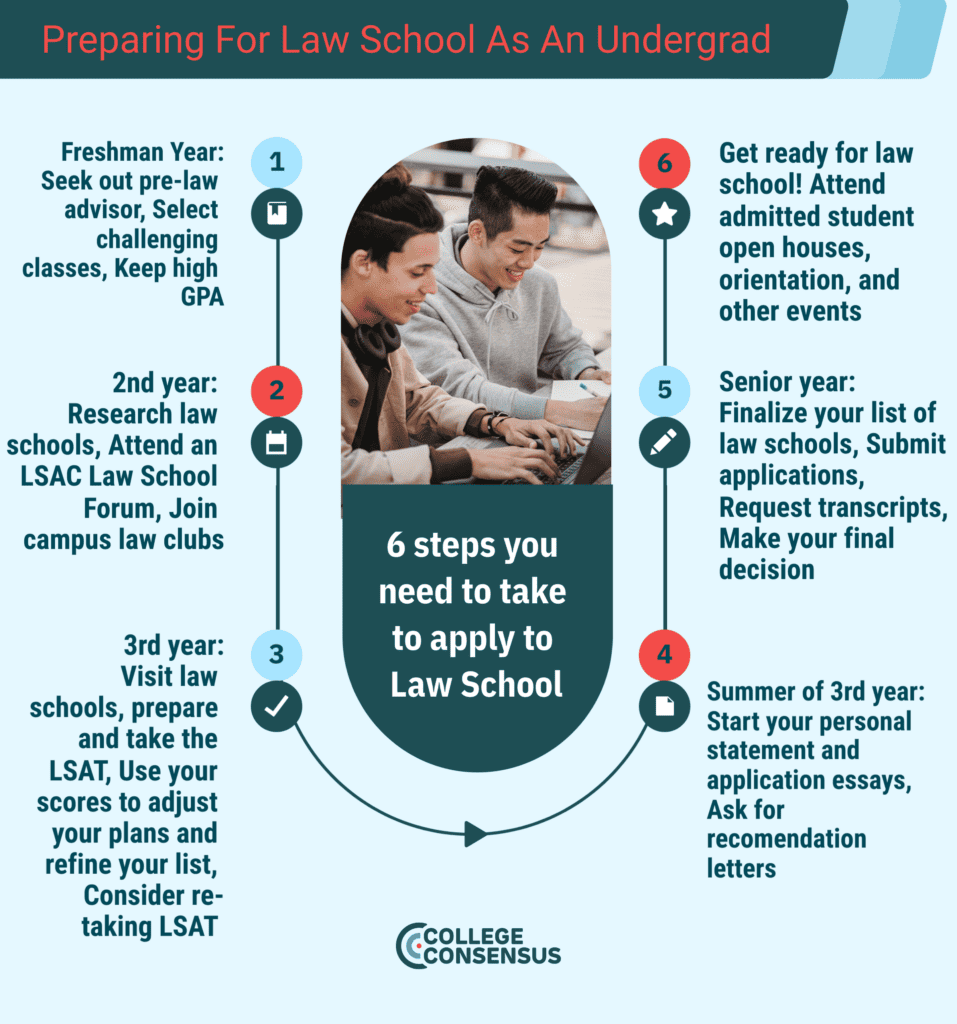Lawyers work in the legal system to represent their clients. For criminal justice cases, the lawyer may prosecute the case or defend a client in the courtroom. Meanwhile, civil cases involve anything from property disputes to class action settlements. No matter what kind of lawyer someone decides to become, there are a few degree requirements that they will need to get before applying for their license.
Steps to become a Lawyer/Attorney
- Look Into Undergraduate Pre-Law Education
- Take the LSAT (Law School Admission Test)
- Go to Law School
- Take Your State Bar Exam
- If You Pass, You Are Admitted to the Bar – Pay Your Dues!

What Degree Does a Lawyer Need?
To become a lawyer, individuals typically need to spend seven years in school.
Initially, students get their bachelor’s degree from a college or a university. Afterward, they must take the Law School Admission Test (LSAT). The student’s university grades and LSAT score will determine whether they get into the top law school of their choice.
The majority of lawyers have to spend four years getting their bachelor’s degree and three years attaining their Juris Doctor degree. For the Juris Doctor degree to count, it has to be from a school that is accredited by an organization known as the American Bar Association (ABA).
What is Law School Like?
Law school is a unique and challenging experience that prepares students for a career in the legal profession. Here are some aspects of what law school is generally like:
Three-Year Program: You’re looking at three years if you’re going full-time. The first year is all about laying down the basics, and the next two allow you to explore more specialized areas.
First-Year Curriculum (1L): Brace yourself for the first year—it’s pretty intense, and breaks a lot of would-be lawyers (that’s no exaggeration – the first-year dropout rate at mid-tier law schools ranges from 13% to as high as 25%). That’s when you’ll dive into foundational courses like contracts, torts, and criminal law, and you will be expected to sink or swim.
Socratic Method: Law professors often use the Socratic method. It’s a bit like a back-and-forth conversation that pushes you to really think about legal cases and concepts. It’s also incredibly nerve-wracking for first-year students.
Legal Research and Writing: Get ready to become a pro at legal research and writing. These skills are a big deal in law school.
Moot Court and Mock Trial: You might also get into moot court or mock trial competitions. It’s like practice for real legal battles.
Internships and Externships: Many law students do internships or externships to get some real-world experience in the legal field.
Grading System: The grading system can be a bit different in law school from typical college classes. Law schools often use a grading curve, where only a certain percentage of students can receive the highest grades. This system can be competitive and add stress to the academic environment.
Bar Exam Preparation: In the final year, you’ll start gearing up for the bar exam. Anyone who has been to law school will tell you, studying for the bar is a full-time job in itself, on top of your regular classes.
Specialization and Electives: In the later years, you can choose electives and specialize in areas that interest you, like criminal law or environmental law.
Law school is notorious for being rigorous and demanding. Getting through law school requires strong analytical skills, effective time management, and dedication like you’ve probably never experienced.
| Median LSAT Score | Median 1st-Year Dropout Rate |
|---|---|
| 155-159 | 2% |
| 150-154 | 4.6% |
| 145-149 | 14.3% |
| <145 | 25.3% |
What Happens After Law School?
Once the student successfully graduates from law school, their work is still not done. Every person who wants to become a lawyer must take a test known as the bar exam. If the student passes this test, people say that they have been admitted to the bar.
The exact rules for getting a license from the bar vary from state to state, but there are some general standards to expect in (almost) any state:
- Must have a JD from an ABA-accredited law school
- Must pass the bar exam and be admitted into the American Bar Association
- Must have no felony convictions
In addition, in some states, applicants to the bar can be disqualified if they committed some form of academic misconduct in law school (such as cheating or other ethical violations).
However, there are no federal requirements to become a lawyer, so each state’s particular rules are the only rules that apply.
If the lawyer wants to practice in another state, they will have to take the bar exam all over again. The state may also require lawyers to enroll in continuing legal education every one to three years to keep their license. The number of courses and the kind of courses depends entirely on the state.
What Kind of Bachelor’s Degree Should Students Get?
Technically, students can get into law school with any kind of bachelor’s degree. Some schools have a pre-law program that helps prepare students for law school after they graduate with their bachelor’s degree. However, pre-law is not at all the only way to go.
In general, students should pick a major that matches their future goals. If the undergraduate college does not have a pre-law program, students should take courses that match the law school’s admission requirements.
When it comes to picking a bachelor’s degree for law school, there’s no strict rule—you’ve got some flexibility. There is no specific bachelor’s degree required for law school, and students with diverse academic backgrounds are accepted.
What matters most are skills like critical thinking, analysis, and good communication. That being said, certain degrees can give you a better foundation than others:
Political Science: Many law students have a background in political science, as it covers topics related to government, law, and policy.
History: A degree in history can help develop research and analytical skills, which are crucial in the legal field.
English/Literature: Strong writing and communication skills are essential for lawyers. An English or literature degree can help develop these skills.
Philosophy: Philosophy courses often involve critical thinking and analysis, skills that are valuable in law school and the legal profession.
Economics: Economic principles can be relevant in certain areas of law, such as business law or antitrust law.
Criminal Justice: A degree in criminal justice may provide a relevant foundation for those interested in criminal law.
Business or Finance: If you are interested in corporate law, a background in business or finance can be beneficial.
Paralegal/Legal Studies: A lot of lawyers start out a paralegals, and a formal degree in legal studies can put you on the right track from the start.
Remember, it’s not just about the degree. It’s important to note that law schools appreciate diversity in academic backgrounds, so students are encouraged to pursue a degree in a field they are passionate about.
Additionally, maintaining a high GPA and scoring well on the Law School Admission Test (LSAT) are critical factors in gaining admission to law school. Some law schools may also consider extracurricular activities (like volunteering), work experience, and letters of recommendation.
Ready to start your journey?
Is Law School Required?
While some states offer alternative ways to become a lawyer, law school is required in most states. In most states, as well, the law school should be recognized by the American Bar Association.
Even when a state allows students to take the bar exam without a law degree, there are potential problems that students should watch out for. In the state of Washington, students can technically study and work for a lawyer for a set amount of time instead of going to law school. Then, they are allowed to take the bar exam. Only a few students ever choose this option because it can be extremely difficult to find a practicing lawyer who is willing to be the student’s mentor. Even if students manage to find a practicing lawyer to mentor them, they will still have a harder time getting hired without a law degree.
Overall, the majority of prospective lawyers will need to spend seven years in school before they can take the bar exam and become a lawyer. After four years in a bachelor’s degree program, students will spend another three years in law school. With a bachelor’s degree and a Juris Doctor degree, students can take their bar exam and become a practicing lawyer.
Related Articles
10 Best Degrees for Getting Into Law School
What is a Juris Doctor Degree?
Recommended Online Degree Programs
Explore our featured online programs to find the right match for you today.

